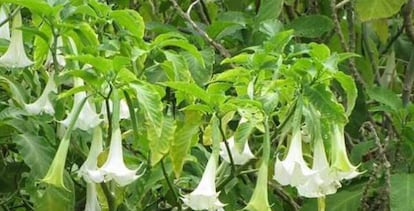Burundanga, the stealth drug making a name for itself in the US and Europe
Widely known in Latin America, use by criminals of this incapacitating substance is spreading


Over the last two decades, there have been occasional reports in Spain of people, particularly women, being intoxicated with burundanga, a substance that causes amnesia and saps the victim’s willpower, leaving them exposed to robbery or sexual assault. But very few cases have ever made it to court because of the difficulty of proving the facts.
Now, for the first time, a confirmed case has been detected in Spain (see box below). But in Latin America, the dangers of burundanga are well known.
Scopolamine was once used as a painkiller during childbirth, along with morphine and chloroform
Burundanga is the popular name for a drug that contains scopolamine, which is used in medicine to treat nausea and motion sickness, among other conditions. But its side effects include drowsiness, a loss of inhibition and memory lapses.
In Colombia, police figures show that three crimes are perpetrated every day using scopolamine. The US State Department describes it as one of the “most dangerous” narcotics available, and estimates that there could be as many as 50,000 related crimes a year.
The drug is derived from Datura Stramonium, a plant that is easy to find in Spain and Latin America. In English it goes by a variety of names, the most common being Jimson weed.
It has white, trumpet-shaped flowers and seeds containing two alkaloids, hyoscyamine and scopolamine. The scopolamine is mixed with various other chemical compounds to create burundanga.

It is sometimes known as “the zombie drug” because it takes away the victim’s willpower. There are numerous reports of people who testified to police they were robbed or suffered brutal sexual assaults without remembering any of the details. Typically, the last thing they remember is taking a sip from a drink at a bar in the company of somebody they had just met, or being inside a taxi and having the driver suddenly shake a cloth in their face.
The powder has no flavor, no color and no smell, and criminals normally dissolve it in drinks or mix it in with food or tobacco. It is commonly used in bars and other night venues in Caracas and Bogotá. Small-time crooks often use attractive women as a lure to attract men, whose drinks they then lace with burundanga.On the streets of Bogota, a gram of burundanga sells for less than $30.
There is a widespread belief that burundanga can also penetrate the skin to enter the bloodstream, but most experts have ruled out this possibility.
Scopolamine was once used as a painkiller during childbirth, along with morphine and chloroform. Its use was discontinued after women suffered from hallucinations and woke up without remembering anything about the delivery.
One of the main problems police face in cases involving the use of burundanga is that victims cannot remember anything. To make matters worse, the effect of burundanga means that they sometimes actively cooperate in the crime. There have been cases of people who reported being robbed at automatic teller machines, only to have security camera footage reveal that they took out the money themselves while surrounded by a group of people who appear to be their friends.
First confirmed burundanga case in Spain
A new study has just described the first confirmed case of burundanga intoxication in Spain.
The incident took place in the spring of this year in Palma de Mallorca, on the Balearic Islands. A 36-year-old woman arrived at the ER in Son Espases University Hospital, exhibiting “confused behavior, incoherent speech, mydriasis [very dilated pupils], blurry eyesight and unstable walking.”
A urine analysis found no traces of the most usual substances in these cases: cannabis, benzodiazepines, amphetamines, ecstasy, cocaine and opiates. Nor was any alcohol found in her body.
The friend who had brought her to the hospital said she suspected that the patient’s husband – whom she was in the process of divorcing – might have laced her drink with some kind of drug. The patient confirmed this suspicion after recovering.
It was a new situation for the hospital. Personnel at the toxicology unit there launched the protocol for chemical submission cases, and filed a judicial report.
Two days after being discharged, the patient returned to the hospital for a check-up and said her ex-husband had admitted to the police that he used scopolamine against her after purchasing it online.
The case was reported in the Spanish-language medical journal, Medicina Clínica.
English version by Susana Urra.
Tu suscripción se está usando en otro dispositivo
¿Quieres añadir otro usuario a tu suscripción?
Si continúas leyendo en este dispositivo, no se podrá leer en el otro.
FlechaTu suscripción se está usando en otro dispositivo y solo puedes acceder a EL PAÍS desde un dispositivo a la vez.
Si quieres compartir tu cuenta, cambia tu suscripción a la modalidad Premium, así podrás añadir otro usuario. Cada uno accederá con su propia cuenta de email, lo que os permitirá personalizar vuestra experiencia en EL PAÍS.
¿Tienes una suscripción de empresa? Accede aquí para contratar más cuentas.
En el caso de no saber quién está usando tu cuenta, te recomendamos cambiar tu contraseña aquí.
Si decides continuar compartiendo tu cuenta, este mensaje se mostrará en tu dispositivo y en el de la otra persona que está usando tu cuenta de forma indefinida, afectando a tu experiencia de lectura. Puedes consultar aquí los términos y condiciones de la suscripción digital.








































